A Well-Lit Memory: Justin St. Germain’s Son of Gun
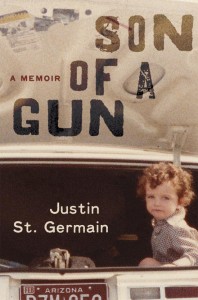 Son of a Gun: A Memoir
Son of a Gun: A Memoir
by Justin St. Germain
Random House, 2013
256 pages / $26 Buy from Amazon
As I read Justin St. Germain’s memoir Son of a Gun, I began circling all the times I came across the words “I wonder”: “I wonder why he never tried to call me, if he was ashamed, if he thought I was”; “I wonder where it is now, if she lost it, if I left it behind in the trailer”; “I wonder if she told him to say that, trying the same trick that worked on the judge who dismissed my case.”
The blurb on my copy’s back cover compares Son of a Gun to The Liar’s Club and This Boy’s Life, and while there’s certainly a likeness, St. Germain’s story isn’t so much as coming-to- age as it is remembering the moment he did—piecing together the events that led his step-father, Ray, to murder his mother with a shotgun.
At a cemetery, when St. Germain and some of his extended family fly to Philadelphia to bury Barbara, he mourns not the passing of his mother but the passing of his memory:
She fades a little more each day: I can’t picture her face, can’t remember a time when she was alive. I don’t know her story, because I’ve tried to forget, and because there was so much I never knew… Nearly a decade now since she died, and all that’s left of her are a few relics and my own suspect memories.
St. Germain opens, though, with perhaps the clearest memory he has: the afternoon he learned of the killing. Riding his bike home, he stares up at the expansive Arizona sky. It’s only been “nine days since the towers fell,” and he’s “newly conscious of planes.” When he arrives at his house, his brother, Josh, tells him the tragic news: “‘She got shot.’”
At a bar later that night, unsure of what to do next (“‘Wait, I guess’”), St. Germain drinks with his friends, watching President Bush address the nation on television: “He said that life would return to normal, that grief recedes with time and grace, but that we would always remember, that we’d carry memories of a face and a voice gone forever.”
Remembering “a face and a voice gone forever”—rounding out his “own suspect memories”—is what St. Germain hopes to solidify ten years later through his writing, and his struggle is not one of coming to terms with the tragedy (who can ever do that?) but of realizing that his recollections, his “truth” about his mother’s life, is what’s most important. That he starts with her death—that when he hears about what happened he doesn’t experience “shock” or “grief” but rather “a recognition, as if [he] had always known this moment would come”— presents an apparent contradiction: that one of his most vivid memories was formed even before it materialized.
Growing up in New Jersey, not far from Manhattan, most people I know can say what they had been doing on September 11th, while many also claim a counter-narrative, what they should have been doing, what they weren’t doing: they missed work because of a last minute disease; they didn’t get on one of the flights because of traffic; they decided not to take a day trip into New York that morning. I always thought there was a slight self-centeredness to such thinking—it could have been me, but wasn’t—and likewise, invoking such a large concept at the start, his mother’s death in the wake of 9/11, runs the risk of the same solipsism. St. Germain, however, does this so skillfully and so deftly that he’s completely changed my thinking, especially on the first matter. It’s not a selfish act for the could-have-been-victims of the terrorist attack to imagine if it had been them, or a loved one, or somebody they knew; instead, it’s a way to try and make sense of something insensible, even if it’s not completely shocking, or even, perhaps, if it’s already been there as a likelihood in one’s mind all along.
June 16th, 2014 / 4:30 pm
The Last Horror Novel in the History of the World by Brian Allen Carr
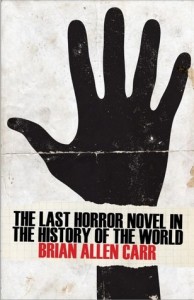 The Last Horror Novel in the History of the World
The Last Horror Novel in the History of the World
by Brian Allen Carr
Lazy Fascist Press, May 2014
128 pages / $9.95 Buy from Amazon
Brian Allen Carr’s The Last Horror Novel in the History of the World is a bewildering book—a work of low-key madness. It’s a novel that moves across literary modes—from horror, to gritty realism, to psychological study—without ever quite embodying any one. In his introduction to the novel, Tom Williams compares the novel’s genre-confounding qualities to the border between Mexico and Texas, where Carr lives: “the border that exists between the fiction deemed as literary and that deemed as genre is far better policed and regulated than the border between Mexico and Texas.” You, like me, might be skeptical of such a claim—if anything, the Jonathan Lethems and Gillian Flynns of the world seem to suggest that the border between literary fiction and genre fiction has worked out a pretty decent immigration system—but Williams’ point still resonates: Carr’s novel is difficult to categorize. If anything, the idea of just one border is too reductive here: The Last Horror Novel feels, perhaps, like a dispatch from the four corners of the American Southwest, with Carr standing upon the intersection, dipping his foot into each of the states for only a second at a time.
Carr’s novel takes place in the evocatively named Scrape, Texas. Seriously, you know exactly what this town is like without me—or Carr, for that matter—describing an inch of it. Scrape is a “blink of crummy buildings, wooden households—the harsh-hearted look of them, like a thing that’s born old.” In this town, young and old alike seem stranded. The denizens drink beers, sleep with one another, and antagonize other races. A young woman like Mindy was lucky enough to get north to Austin for college to engage in artistic revelry, attending screenings at the cinema and falling in love with art films, but life blew her back like dust to Scrape. She and a handful of other characters—including racist Burt; his buddy, Manny; Tyler, the victim of Burt’s racism; jerk-off Tim Bittles, with his dick pics and “cell phone titties;” Teddy and Scarlett, who spend the novel either pre- or post-fucking; Blue Parson and Rob Cooder, who just want to drink beer all day; and convenience store clerk Tessa—wander through the town, working, killing time, and making secret their bouts of herpes.
A great boom—massive, shattering—changes this, and “newscasts show static.” Burt says, “Something’s off,” and he isn’t kidding: for reasons Carr never attempts to explain, horrors have been unleashed upon the town of Scrape. First, there is La Llorona, “the Weeping Woman,” a ghost that gathers replacements for the children she drowned. Then, there is the “fuzzy hand, the Devil’s hand, the black hand, the hand of Horta,” which brings violence and death to the world of the living. In short, the town of Scrape—full of small town American decadence—is assaulted by the myths of Mexican culture. And the residents of Scrape, in true American fashion, respond by fetching their guns and shooting without thinking.
This is a “genre novel,” yes, but not in the way most mainstream readers would expect. Instead, it’s a “genre novel” in a way that most literary/Alt-Lit readers (and readers of HTMLGIANT, certainly) will be comfortable with. By that I mean, it fucks shit up enough to be interesting, but doesn’t delve deeply enough into genre to be deemed boring. Early in The Last Horror Novel, Carr signals his generic divide while describing Scrape as being positioned between “two legitimate cities”: Corpus Christi and Houston. Carr’s novel, therefore, occupies an illegitimate space—not too different, really, from the so-called “illegitimate” space that genre fiction occupies. For instance, Carr flirts with one of the great tropes of the Victorian gothic: the notion of the “gentlemen’s club,” i.e., men of science, sitting around, discussing things that science cannot explain. Gothic tales tend to rely upon the unutterable: how, after all, to describe the uncanny happenings of the world? In this sense, Carr’s novel feels like old-fashioned horror: his characters huddle, attempting to explain the unexplainable. A rickety tree house becomes Carr’s version of the “gentlemen’s club.”
This is a short novel, and Carr’s style is elliptical and spare. A recent work of fiction like Katherine Faw Morris’ Young God comes to mind, though Carr is far more playful. Maybe the stripped down prose of Brautigan is the more apt analogue, and Carr’s cultural commentary seems to operate a bit like Brautigan’s: he embodies a milieu so fully that he winds up satirizing it without expending a single extra breath. Many of his chapters are just a few paragraphs, and the book’s already trim 121 pages contain a lot of white space. Within this small frame, Carr moves through literary modes that go beyond genre, from the dirty realism of Scrape, to a section labeled “Thoughts” that becomes psychologically probing and revealing in a way that nothing else in the book is. Then, in this novel of jagged edges, there’s an additional piece: a first-person voice that floats through the text—something between Jeffrey Eugenides’ The Virgin Suicides and Joan Chase’s During the Reign of the Queen of Persia, though lacking either novel’s coherence.
Does all of this add up? No. Is it supposed to, or does it need to? On those points, I’m less certain. The end of The Last Horror Novel sort of dissolves, crumbling in the reader’s hand—but then, when unspeakable horror is unleashed onto the world, what other possible ending is there aside from gradual dissolution? This fatalism makes Carr’s novel feel emotionally muted but brief enough for this not to matter; it is, after all, closer to a long short story or novella than anything else, and as a result, Carr works out one idea and produces interesting results. It may not seek emotional complexity, but it’s effective in its portrait of characters that think themselves at a dead end. Ultimately, Carr is ingenious in externalizing this existential angst by deploying the conventions of a genre. There’s an apocalypse coming to Scrape, Texas, and Carr seems to be saying, “You think your life’s at a dead end? You ain’t seen nothing yet.”
***
Benjamin Rybeck is events coordinator at Brazos Bookstore in Houston. He writes for Kirkus Reviews, and his work also appears or is forthcoming in Electric Literature’s The Outlet, Ninth Letter, PANK, The Rumpus, The Seattle Review, and elsewhere. His fiction has received honorable mention in The Best American Nonrequired Reading and The Pushcart Prize Anthology, and he is currently seeking an agent and/or publisher for a novel and a short story collection.
June 16th, 2014 / 10:00 am
The Real-Time Review League reads nods by Carrie Lorig
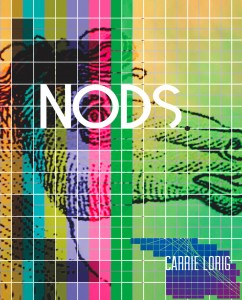 nods
nods
by Carrie Lorig
Magic Helicopter Press, 2013
48 pages / $7 Buy from Magic Helicopter Press
July 25, 2013
Kelin,
I read through the first half of nods., like we said. I’m happy to be doing it in two pieces, as the book leaves me a lot to process.
For me, what comes first here are impressions. Looking into the dark and seeing shapes, but waiting for your eyes to adjust before you can make out bodies and what they are doing.
I read the first “Scatterstate” and thought, if I had to define this term, it would be:
scatterstate: noun, immersion in repetition and variation of words; a swelling up of words, which become, in addition to their actual definitions, their sounds and the feeling of hearing/thinking them over and over; an inundation
When it is too much to think about, I am left with hearing and feeling and drawing conclusions from those sensations. And because of THE PAGE and her use of space on THE PAGE, sometimes it is too much. I think she knows this. Because it’s not like eating too much ice cream; it’s like tumbling down too much mountain, or hiding under too many houses. It surprises and excites me, too, when out of this inundation, narrative is born, which happens here.
So much here depends on unlikely pairings of words—sometimes as separate, paired words, and sometimes as compounded words. A few of my favorite compounds from p17: “mangovault,” “niagarafalafel,” “boozyoveralls,” “meatbowl.” This chapbook asks us to wonder, what happens when you push two, separate, unlike things together? How do we make sense of that? And in that way, it is a painstaking immersion in the messy business of sex and love. Preparing to leave for a long vacation without Phil tomorrow. I want to go and I don’t want to go. It feels, sometimes, like we are always orbiting the same thing, but at different rates. I’m being dramatic—everything is fine, of course, we’re very happy. But love is never easy or clean.
Last night we ate waffles filled with curried chicken from a food truck. It makes me wonder, if waffles can be a vehicle, what else can?
Last week, I sent Tyler Gobble a link to your work and he said it reminded him of Carrie’s. I hadn’t read much of Carrie’s work, but reading it now, I see what he means. I am so seriouseager to hear what you think.
xoCaro
*
July 30, 2013
Dear Caro,
I hope you are having such a wonderful trip with your sister and nephew! Minneapolis has been incredible. We have seen so many friends, and late twenties looks good on everyone. Watching them relax into themselves is making me feel more relaxed too. I now have the urge to kick anxiety once and for all. Getting an MFA in our early twenties was MISLEADING to say the least. The moment I calmed down, I noticed a LOT of people DON’T have an anxiety disorder. I don’t want one either. It is taking up my time. I’ll keep my phobias though. My life is sort of built around avoiding fish and vomit. (Walking around Lake Nokomis, I SAW A DEAD FISH THE SIZE OF MY THIGH).
Anyway, calm is what I want to work out with nods. I read myself into a frenzy, and the frenzy was, I DON’T HAVE A PLAN TO SEE CARRIE YET. One thing I forget about Carrie, and about Nick too, is that they are CALM. I called her, and even her “hello” was grounded. I’m not sure her phone recognized my number. I wonder if folks can read my anxiety-energy from my hello??. It usually either means are you a schemer?? or are you mad at me??. What I’m learning on this trip is that I don’t think people are mad at me. And what I’m trying to say here, is that Carrie is a keel. Before I called her, I chattered my way around the first “scatterstate,” loving it, getting RATTLED by “noiseflowers.” Getting hurt by “i’ll let you know if i hear anything more from you.” I underlined and circled words, sentences… There is an energy here, and there is an energy in Carrie’s calm. I get excitable talking to her, and I don’t get anxious. We made plans to see each other.
When I hung up and hit page two, I wasn’t in racket anymore, I was in flow. If a word or line rattled me, it didn’t jut out anymore, just twinkled around a rock in the river. “And my sunburnt eyes are touching each other with this beautiful delivery of flow hurt…” There is anxiety too: “you have to find a feeling / and hurt its tiny dead / glow with your hurt”. But instead of the anxiety being some illness in Carrie, it is one that she creates and controls. There is energy spinning in her—and it might be just hers, or she might be open enough to deal with my own.
On the phone she and I talked about sharing the sex we write in poems with our parents. I love your thought about the forced merging of concepts (FUELBOOGER) as being like sex and love. I need more people to talk about sex that way. I need more people to talk about sex in every way other than bikini waxes and butt jokes and have you tried….. And so yes, the lights are low in this book, and my eyes never become natural. This groping for vision and relying on sound become mebumbling with someone else’s body in the dark, trying to figure out how it works. I’m thinking about theories of touch and sound. She is building those two experiences without IMAGE. I’m not listening for the pain cattle, I just hear everything. How is this happening?? (NOT a rhetorical question!)
Have your parents read poems you’ve written about sex? (OR WORSE YOUR IN-LAWS?) Wait, do you have poems about sex? Is that what “and spark / and spark” means? (I don’t have your book in front of me—did I quote that right?)
Today is Carrie’s birthday! I’m off to practice my poem for the reading tonight (she is hosting), and to buy her flowers that look like an animal (Nick’s idea).
Love to you guys!
k
P.S. I’m reading with Abraham Smith, and I’m terrified. Not colonoscopy terrified, but on the spectrum.
P.P.S. I want to meet Tyler.
June 13th, 2014 / 10:00 am
25 Points: Standard Twin Fantasy
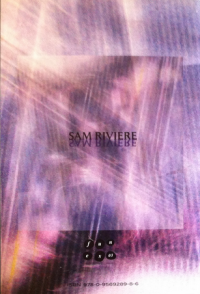 |
Standard Twin Fantasy
by Sam Riviere
F.U.N.E.X., 2014
36 pages / $7.60 buy from Amazon
|
1. Standard Twin Fantasy is a minimalist effort. Twinned in its very design – just fourteen short poems: 7 on the recto until you get to the staples where the whole thing doubles back on itself and delivers another 7 poems on the verso side for the remainder of the book.
2. This attention to detail makes sense for a writer who only started to write poetry whilst still an art-student and follows a swathe of books in the last few years which add such details to their poetry/alt-lit productions (trailers for books, books serialized initially as blogs, as tweets, books such as Riviere’s debut ’81 Austerities’ which include back-matter, more usually associated with non-fiction, that contains 81 reflections on the 81 poems that have come before it. Such things have been extended lately by the subject of my last 25 Points review of Richard Brammer’s ‘Public Dick Punk 83’ which goes as far as including a completely unusable index.
3. In some ways it is tempting to see Riviere as a product of Alt-Lit, and indeed he has admitted and advocated a pro-alt-lit position in his online essay ‘Unlike’: Forms of Refusal in Poetry on the Internet and has borrowed/helped to create many of the innovations of Alt-Lit, but still he seems, to me anyway, to be more of a shadowy figure in the mold of a Jon Leon or a Richard Brammer, rather than one of the many acolytes of Tao Lin, which although they are all different share a kind of Adderall-prose that doesn’t quite seem like these more outsider figures. This is pretty much a baseless thesis, more of a hunch really, but I stick by it.
4. Poem number 1 (all of the poems are untitled which I’m sort of glad about for some reason) instantly seems to evoke Jon Leon’s cast of (un)glamorous actresses, pornstars, flailing supermodels and minor TV stars with sentences such as ‘Sylvia taps a match on the rim of the big glass ashtray’, ‘Elizabeth slides a finger down the inside cover of a magazine’ and ending with the, in my own phrase ‘fucking sublime’ line: ‘Veronique angles the retro remote control and leans against the massive fridge’.
5. Point 3 will seem pretty silly to the typical English poetry reader who very much knows Riviere as a popular and rising god of English poetry, as his first book was published by the esteemed publisher Faber & Faber and he is almost certainly more successful than the aforementioned poets/alt-lit folk. Also, there is a chance that alt-lit will often seem pretty silly to the typical English (ideal?) poetry reader too, but that’s another story.
6. Point 5 sort of helps to confirm point 3 and I will now reinforce point 3 further by stating that some of this content first appeared in the very glossy AnOther magazine which means that this poet is very cool as well as being accepted (rightfully) as literary in the British poetry world. He pulls off the neat trick of being popular in lots of places at once and cannot easily be tethered into some kind of Faber house style as proven by this (possibly self-published?) pamphlet and the fact that this is only his second outing since his ’81 Austerities’ debut. He followed that up with a set of poems themed around/taking Kim Kardashian as a kind of totem (if memory serves) that could only be read by a reader requesting a password from the author.
7. ‘I am designed like depthless vinyl’ is a really good line from one of the poems.
8. These writings often hang together via a fairly simple parallelism.
9. There’s an odd blankness throughout that is coldly endearing. A similar feeling to walking around Hoxton, Shoreditch, and increasingly, Bethnal Green in London (for US readers think Williamsburg or something or wherever things have moved to now). This again means that Riviere is very cool and I don’t mean that pejoratively.
10. Music proper noun namechecks: ‘Exile on Mainstreet’, ‘Smashing Pumpkins’. Both in the same poem. Again this means he’s cool, again this isn’t meant as an insult. Bring back cool, I say.
June 12th, 2014 / 12:00 pm
25 Points: Fare Forward: Letters from David Markson
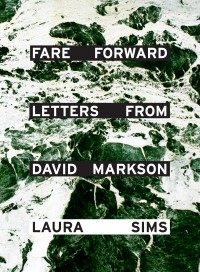 Fare Forward: Letters from David Markson
Fare Forward: Letters from David Markson
Ed. by Laura Sims
powerHouse Books, 2014
153 pages / $12.95 buy from powerHouse Books
1. The first of paragraph of the New York Times obituary of David Markson grants him the following description: “almost always surprisingly engaging and underappreciated.” Which strikes me as one of the most damningly reluctant compliments I’ve ever read one person give another.
2. almost always surprisingly engaging
3. David Markson, in a letter written two months before his death: “Everything I can think of would be making me repeat myself—and I almost prefer the silence. (Actually, I hate it.)”
4. It is endlessly frustrating to attempt to begin a review about a book about Markson. All sentences begin to feel like collections of adverbs and prepositions.
5. Yet adverbs tell us how a verb occurred. Prepositions place us in space. Nothing occurs in Markson’s later work. The only space in which his later novels take place is in the roving scope of the writer’s mind.
6. Nobody comes. Nobody calls. Reads a line from Reader’s Block.
7. Laura Sims’s collection of letters from Markson, called Fare Forward: Letters From David Markson. A series of postcards from a Greenwich Village address, from a writer almost nobody read, who had quit reading novels altogether.
8. Writing to Sims before a reading he was giving in 2007, who had told him she’d planned to bring friends, Markson asked: “But why in hell would you punish any good friend by making him/her go?”
9. I have the sense that this review is going badly, so I’ll here quote the late David Foster Wallace’s lackadaisically phrased claim re: Markson’s Wittgenstein’s Mistress—“a novel this abstract and erudite and avant-garde that could also be so moving makes ‘Wittgenstein’s Mistress’ pretty much the high point of experimental fiction in this country.”
10. Adverbs, too, are splattered all over his obit: “Mr. Markson’s books expressed, both mischievously and earnestly, the hem-and-haw self-consciousness of the perpetual thought-reviser. He wrote mostly monologues, or at least the narration seemed to emanate from a single voice, though the books were not necessarily narrated in the first person.”
June 10th, 2014 / 12:00 pm
The Jesus Lizard Book
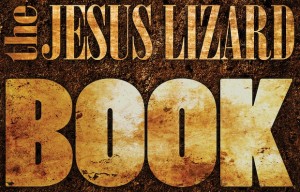 The Jesus Lizard Book
The Jesus Lizard Book
by The Jesus Lizard
Akashic Books, March 2014
176 pages / $29.95 Buy from Amazon or Akashic Books
The Jesus Lizard was the greatest live band ever. This is a sentiment echoed again and again and again in this lovingly crafted hardcover from Akashic Books. Book is filled with testimony from fans, critics, and fellow musicians alike, all trying to articulate the ineffable experience of seeing TJL take the stage, pick up their instruments, and promptly destroy the place.
And they’re not wrong. I saw the band in the first of three final homecoming shows in Chicago during their 2009 reunion tour. Though I was stoked to see the band, in many ways I was mentally preparing myself to be let down, wondering if I’d maybe spoiled the intimate quality of what they offered by seeing it unfold in what was probably hundreds of youtube clips for the preceding three years I’d been listening to them. Not only that, but they were old—like they were in their late forties old, and so nobody could fault them if they fell short of previous glory.
But—fuck me—I had absolutely no idea what I was getting myself into. The guys got on stage, drummer Mac McNeilly cracked his sticks, and within the first verse of the song David Yow was swimming over our heads in a gaudy red button-down and jeans, cowboy boots flailing above us as he shouted, “Give me something to stop the bleeding, cuz I’m fittin to blow. Knock her down the stairwell and kick her. I think you can take her.”
From there it became increasingly clear as the band bruised us with their set list—dark, pernicious, brutal fucking songs—and as Yow took down tallboy after tallboy of Budweiser, you really had no idea what was going to happen. My friend Kurt said he’d stopped making eye contact with Yow after the second song, afraid he was going to slink or slobber or scream his way over and have a laugh at his expense. This wasn’t unwarranted: near the last third of the show, Yow, by this point drenched in sweat and his own foamy vomit, steadied himself on the gate in front of Kurt’s sister and leaned over, gently, but firmly, placing his open palm over her nose and mouth and holding it there, mouthing the words, “I’m so sorry” over and over again with crossed eyes. The bouncer lifted him off of her and plopped him back on stage, coming back over to ask, “Are you okay?”
June 9th, 2014 / 10:00 am
Let’s Overanalyze to Death… A little girl from Kyrgyzstan
About a year ago, a YouTube user called stos2408 posted a video entitled маленькая девочка дирижирует хором, Little Girl Conducting the Choir. As you might expect, it shows a little girl conducting a choir.
The video is just 64 seconds long and yet it is mesmerizing, inimitable, absolutely beautiful. It is hilarious and dumb and true in a way that art isn’t readily able to duplicate. A stolen moment from a choir practice in Kyrgyzstan – or so we learned later, when an enterprising journalist tracked down stos2408 and found out where this kid lived, where these singers sang, where stos2408 was sitting when he imported the video from his camera to his computer, appending a Cyrillic title, uploading it to the world.
June 7th, 2014 / 10:00 am
BEAUTY BY HTMLGIANT: Leesa Cross-Smith
I was raised on Clinique and wet n wild, Chanel No. 5 and Love’s Baby Soft. I love super-fancy makeup and the cheap stuff. I got fussed at in high school theatre class because I didn’t put on enough makeup. That oil-based stuff made me feel like I was suffocating.
I don’t wear a lot of makeup, but I do love lipstick/lip gloss and eyeliner. I rarely leave the house without those. If it’s early, I’ll only line my top lid. If it’s later, I’ll line the bottom lid, too. A smokey-eye for nighttime. Winged eyeliner is a part of my personality. I’ll also wear a little under-eye concealer and powder. If I don’t feel like doing anything much at all, I’ll wear extra red lipstick and put my sunglasses on.
 Revlon ColorStay Ultimate Suede is my favorite cheap lipstick of the moment, and I always have Clinique Black Honey Almost Lipstick with me. It looks good on everyone! I also love Benefit’s Sugarbomb. I have about 25 lip glosses in my purse because if I see one I even think I might like, I get it. I once read that your lips can get “addicted” to lip gloss, so that’s obviously where I am. I stash them all over the house: on the kitchen sink, on the living room table, next to the toothpaste, next to the bed. I’m the same with bobby pins. My earrings, too. I can go from room to room and reach my hand out and find a pair of earrings, a bobby pin, and a lip gloss.
Revlon ColorStay Ultimate Suede is my favorite cheap lipstick of the moment, and I always have Clinique Black Honey Almost Lipstick with me. It looks good on everyone! I also love Benefit’s Sugarbomb. I have about 25 lip glosses in my purse because if I see one I even think I might like, I get it. I once read that your lips can get “addicted” to lip gloss, so that’s obviously where I am. I stash them all over the house: on the kitchen sink, on the living room table, next to the toothpaste, next to the bed. I’m the same with bobby pins. My earrings, too. I can go from room to room and reach my hand out and find a pair of earrings, a bobby pin, and a lip gloss.
Gertrude Stein’s Tender Buttons
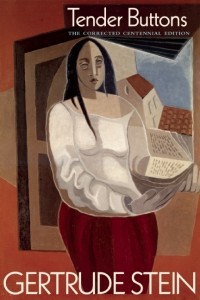 Tender Buttons: The Corrected Centennial Edition
Tender Buttons: The Corrected Centennial Edition
by Gertrude Stein
Edited by Seth Perlow
City Lights Publishers, April 2014
134 pages / $9.95 Buy from City Lights or Amazon
Gertrude Stein’s Tender Buttons came at the right time. Of course, it made no sense to me at first, as did the roller coaster of events in my life during the 3 times I read it. I went through some serious changes just trying to figure out how I felt about Stein, much less the book. One minute, I enjoyed her experimentalism, an obvious reflection of her larger-than-life persona. The next, she irritated me, like an itchy eyeball or a throat tortured by the skin of a popcorn kernel.
It took a while to break through the frustration that mirrors that one literary reading you attend where no one wants to admit they’re clueless about what the guest speaker is saying. Still, there’s a cacophony of ‘mmm’s’ at the conclusion of all his poems. Head nods from the audience give him confidence to admit he wrote the final piece on the bus ride over as he holds the paper at an angle where the room’s lighting spills over typed words. But, everyone smiles and over-compliments him at intermission over refreshments, and mocks the boorish girl who tells him that he has a chunk of salami stuck between his front teeth.
I didn’t want to be that audience, and I wanted to believe that Stein was the random chick who said the obvious, even when it was hard to digest or accept. That’s when I decided to give the text another go (this time, from a different angle) and found the absurdity of Stein’s words surprisingly satisfying as I started reading them aloud. I drew the shades one day, lit candles in my tiny apartment, and settled on the futon, paperback in one hand and a glass of wine in the other. The Stein-like shawl I’d draped over my shoulders and pinned with a broach threw me into character and suddenly, I was reading the way I’d seen several of my favorite writers read. With passion and rhythm and a glowing grace. I stopped thinking and felt everything. My tongue was on fire as the words fell out effortlessly.
June 6th, 2014 / 10:00 am
25 Points: Godzilla
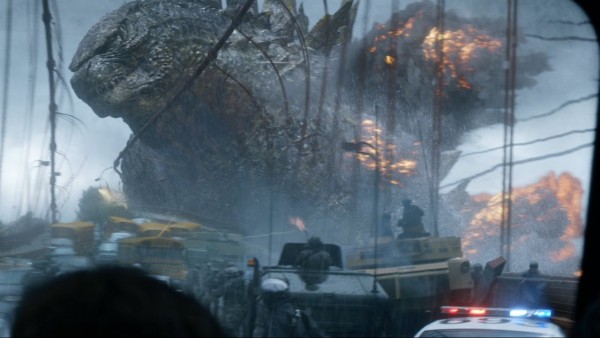
1. Spoiler Alert: Godzilla breaks shit and wins at everything.
2. Bryan Cranston is the best actor in this movie.
3. They fucking kill Bryan Cranston in the first third of the movie.
4. Confirmed societal standard: it’s still not okay to have New York City as the setting for a cataclysmic event that involves mass amounts of destruction—fictional monster battles included.
5. Aaron Taylor-Johnson’s character has a strange combination of good and bad luck due to the life-threatening situations he falls into and narrowly escapes at consecutive twenty-minute intervals.
6. Ken Watanabe is the second best actor in this movie.
7. Godzilla and I have similar lifestyles: go hard for about a week then sleep off the insanity for months or years on end. Repeat accordingly.
8. Godzilla actually looks like Godzilla in this movie. (Compared to the abomination made in 1999 that shan’t be named.)
9. This movie impressed me with its effective use of slow-pace plot format in actually waiting to show us our reptilian friend and all the loveable destruction he brings. (See Jaws for similar example.)
10. It’s actually pretty neat to have characters, besides Godzilla, that you actually give a shit about and have semi-decent back-stories. READ MORE >
June 5th, 2014 / 5:00 pm
